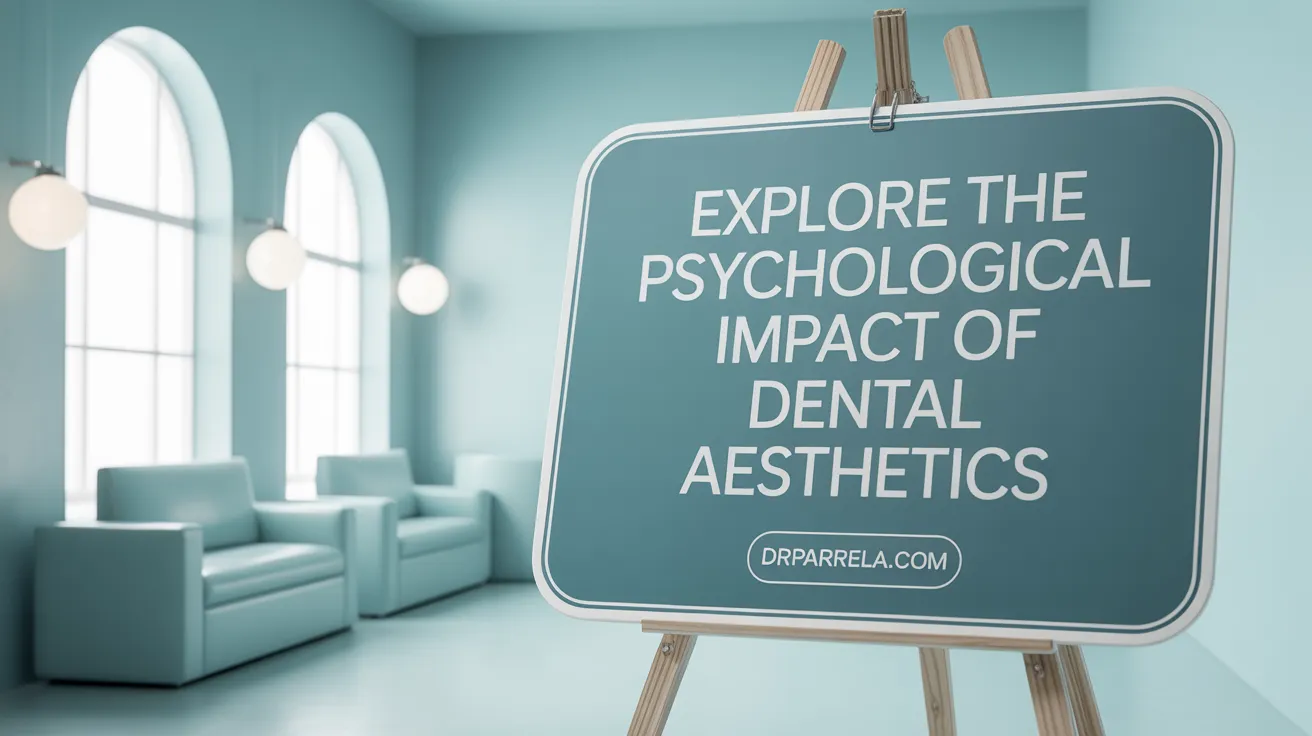The Smile-Confidence Connection
A radiant smile can serve as a gateway to improved self-esteem and richer social and professional experiences. Cosmetic dental procedures, which enhance the appearance of teeth and gums, have grown increasingly popular as individuals seek not just aesthetic improvements but also psychological uplift. This article explores how cosmetic dentistry boosts self-esteem and confidence, revealing the deep interplay between oral appearance and mental well-being.
Psychological Roots: How Dental Esthetics Influence Self-Perception and Social Interactions

How does dental esthetics affect self-esteem and social interactions?
Dental esthetics play a crucial role in shaping facial attractiveness, which directly influences an individual's self-perception and social life. Imperfections such as crooked, discolored, or missing teeth often result in lower self-esteem and increased social anxiety. Conversely, improvements in dental appearance enhance confidence, making individuals more approachable and open to social engagement (Influence of dental esthetics on facial attractiveness, Boosting self-confidence with dentistry, Psychological benefits of smile makeover).
What is the role of self-esteem levels in the desire for cosmetic dental treatments?
There is a clear link between self-esteem, gauged by the Rosenberg Self-Esteem Scale (RSES), and the pursuit of cosmetic dental procedures. Those with low self-esteem tend to show a greater interest in enhancing their dental aesthetics. Additionally, individuals who have undergone cosmetic dentistry before are significantly more likely to seek further treatments, reflecting the positive psychological impact of these procedures (Role of self-esteem in esthetic dental treatments, Connection Between Cosmetic Dentistry and Self-Esteem, Psychological benefits of cosmetic dental procedures).
Are there variations in cosmetic dental treatment interest based on age or education?
Self-esteem levels fluctuate with age; notably, individuals over 45 years tend to report higher self-esteem scores. Educational background also influences attitudes toward cosmetic dentistry; people with lower levels of education are generally more willing to seek esthetic dental treatments. These variations highlight how personal and demographic factors shape treatment inclinations (Age-related variation in self-esteem scores, Educational influence on cosmetic dental attitudes).
Why might laypeople be more inclined toward cosmetic dental procedures than dental professionals?
Laypeople display a stronger inclination to pursue cosmetic dental treatments compared to dental professionals or students. This difference likely stems from dental professionals' awareness of potential long-term complications and risks associated with cosmetic procedures, making them more cautious in seeking such treatments (Difference between laypeople and dental professionals in pursuing esthetic treatments, Comparison of esthetic treatment interest among laypeople, dentists, and students.
Overview Table
| Topic | Influence | Notes |
|---|---|---|
| Dental esthetics on self-esteem | Enhances confidence and social ease | Imperfections cause anxiety |
| Self-esteem and treatment | Lower self-esteem increases treatment interest | Prior experience boosts further pursuit |
| Age's role | Older adults (>45) have higher self-esteem | Affects willingness for treatments |
| Education effect | Lower education linked to higher treatment interest | Reflects socio-economic factors |
| Laypeople vs professionals | Laypeople more eager for cosmetic treatments | Professionals aware of risks |
(Resources: Influence of dental esthetics on facial attractiveness, Boost Your Confidence with Cosmetic Dentistry)
Popular Cosmetic Dental Procedures and Their Role in Enhancing Self-Esteem

What are the common cosmetic dental procedures that enhance smile appearance?
Cosmetic dentistry offers various treatments aimed at improving the look of your smile and addressing dental imperfections. Popular procedures include:
- Teeth Whitening: Removes stains and discoloration to brighten teeth.
- Porcelain Veneers: Thin shells bonded to the front of teeth to cover chips, cracks, gaps, or discoloration.
- Dental Bonding: Applies tooth-colored resin to conceal minor chips or cracks.
- Orthodontics: Braces and clear aligners like Invisalign straighten misaligned teeth.
- Dental Implants: Titanium posts surgically implanted to replace missing teeth.
- Crowns and Gum Contouring: Restore damaged teeth and reshape gums for balanced aesthetics.
- Tooth Reshaping/Contouring: Removes small amounts of enamel to correct tooth shape.
Each procedure targets specific issues such as discoloration, misalignment, or structural damage.
How do these procedures affect self-confidence?
Cosmetic dental treatments deliver immediate, noticeable enhancements to appearance, which can significantly boost self-esteem. Whiter, straighter, and more balanced smiles help individuals feel more attractive and confident. This newfound confidence often translates into increased social participation and improved professional opportunities. Patients frequently report feeling less self-conscious, leading to more frequent and genuine smiling that further enhances mood and interpersonal interactions. Learn more about the psychological benefits of cosmetic dentistry, boosting self-confidence with cosmetic dentistry, and how cosmetic dentistry can improve mental health.
What is the typical longevity and maintenance required for these cosmetic treatments?
The durability of cosmetic procedures varies:
| Procedure | Longevity | Maintenance |
|---|---|---|
| Veneers | 10 to 20 years | Good oral hygiene and regular checkups |
| Dental Bonding | 2 to 8 years | Avoid hard foods; dental cleanings |
| Dental Implants | Permanent | Diligent hygiene and dental visits |
| Teeth Whitening | Several months to years | Periodic touch-ups; avoid staining habits |
Consistent oral care and regular dental visits are essential for preserving results and prolonging the benefits of cosmetic treatments. Choosing procedures tailored to individual needs also supports lasting satisfaction and improved self-esteem. For more detailed information, see cosmetic dentistry benefits for self-esteem and confidence.
The Psychological and Mental Health Benefits of Cosmetic Dentistry

How does cosmetic dentistry contribute to mental health?
Cosmetic dentistry significantly contributes to mental health by elevating self-esteem through improved dental aesthetics. Procedures like teeth whitening, veneers, and bonding allow individuals to feel more confident about their smiles. This boost in self-confidence reduces social anxiety and encourages more frequent smiling. Smiling activates the release of mood-enhancing neurotransmitters such as dopamine and serotonin, which enhances overall emotional well-being and resilience (source).
Is there evidence linking oral health improvements with better mental health outcomes?
There is clear evidence supporting a connection between oral health and mental health. Poor dental appearance or oral health issues can lead to social withdrawal, low self-esteem, and heightened depression or anxiety. By addressing dental imperfections through cosmetic dentistry, individuals often experience less psychological distress. These treatments promote greater social interaction and improve psychological health by transforming self-perception (source).
What psychological outcomes do patients report after cosmetic dental treatments?
After cosmetic dental treatments, patients commonly report increased confidence and attractiveness, making them more willing to engage in social and professional environments. Smile makeovers lead to higher self-esteem, which can reduce feelings of self-consciousness (source. Additionally, these treatments often inspire positive behavioral changes, including better oral hygiene habits and healthier lifestyle choices (source). These factors contribute to long-lasting mental health benefits and enhanced quality of life (source).
Cosmetic dentistry thus holds a valuable role beyond physical appearance, fostering improved mental health, social participation, and emotional well-being.
Cosmetic Dentistry’s Influence on Social and Professional Life

How does an improved smile affect social interactions?
An improved smile significantly enhances social interactions by making individuals appear more friendly, approachable, and trustworthy. A confident, attractive smile reduces social anxiety and encourages people to engage positively with others. Those with better dental aesthetics often feel more comfortable in social situations, which fosters stronger personal relationships and a more outgoing social presence (psychological benefits of smile makeover, Cosmetic Dentistry and Confidence).
What are the professional benefits of cosmetic dental treatments?
Cosmetic dental treatments offer substantial professional advantages. Enhanced smiles create better first impressions, a critical factor in job interviews and career progression. Individuals with improved dental aesthetics often exude greater confidence, which supports clearer communication, more effective networking, and stronger workplace interactions. These benefits cumulatively can provide a competitive edge in professional environments (psychological impact of cosmetic dentistry, Impact of Cosmetic Dentistry on Confidence).
Are there statistics highlighting the importance of a smile in social perception?
Yes, statistics underscore the importance of smiles in how people are perceived socially. Nearly 48% of Americans consider a smile the most memorable feature after meeting someone. Moreover, 99.7% of adults recognize smiles as key social assets, highlighting the cultural value placed on confident, appealing dental appearance. These numbers reflect a strong societal association between a pleasant smile and positive social outcomes (Connection Between Cosmetic Dentistry and Self-Esteem, Facial attractiveness and dental esthetics.
Why does a confident smile increase approachability and communication?
A confident smile signals openness and positivity, making others more likely to approach and communicate freely. This can reduce social barriers and foster smoother interpersonal interactions. People tend to perceive those with bright, well-aligned teeth as more warm and engaging, which enhances both casual conversations and deeper connections (Boosting Self-Confidence with Dentistry, Smile as a Memorable Feature.
How do cosmetic dentistry results translate into career opportunities?
Professionals with an appealing smile are often viewed as more competent, trustworthy, and successful. This perception can lead to improved job prospects, easier relationship-building at work, and greater chances for advancement. By enhancing oral appearance, cosmetic dentistry can empower individuals to present their best selves, impacting hiring decisions and daily professional dynamics positively (Psychological benefits of cosmetic dental procedures, Cosmetic Dentistry and Social Confidence).
Choosing Cosmetic Dentistry: Personalized Treatment and Expectations

How should patients approach choosing cosmetic dental treatments?
Choosing cosmetic dental treatments starts with a thorough consultation with a qualified cosmetic dentist. This initial step is essential to assess individual oral health status alongside aesthetic desires and concerns. Personalized treatment plans crafted during this consultation align the patient’s unique dental needs and goals with the most suitable cosmetic procedures, ensuring both functional integrity and enhanced appearance (source).
What considerations influence the choice of cosmetic procedures?
The selection of cosmetic dentistry procedures is influenced by several factors:
- Specific dental issues such as discoloration, gaps, chips, or missing teeth (source).
- The patient's budget and how much they are willing to invest (source).
- Duration and frequency of treatments (source).
- Maintenance needs and lifestyle compatibility (source).
Experts emphasize the importance of a balanced approach where skilled practitioners integrate cosmetic improvements with preservation of oral health for sustainable outcomes (source).
Why is selecting a qualified practitioner important?
Choosing a skilled and patient-centered cosmetic dentist is crucial. Experienced practitioners provide natural-looking and authentic results while minimizing potential risks. They tailor treatments to each patient's needs and provide comprehensive care, which enhances treatment satisfaction and boosts patient confidence in their new smile (source.
What role does maintenance play in lasting cosmetic results?
Maintenance is vital to sustain the benefits of cosmetic dental work. Patients should adhere to good oral hygiene practices, attend regular dental visits, and avoid foods or habits that stain teeth. Following specific post-treatment care advice from the dentist helps extend the longevity of procedures like veneers, bonding, or whitening, preserving both health and aesthetic appeal (source).
In summary, choosing cosmetic dentistry requires careful consultation, consideration of personal factors, selection of a qualified dentist, and commitment to maintenance. This comprehensive approach supports achieving beautiful, lasting smiles that improve confidence and oral health (source.
The Lasting Impact of a Confident Smile
Cosmetic dentistry transcends physical enhancement, offering profound psychological and social benefits by boosting self-esteem, reducing social anxiety, and enriching mental health. Whether through teeth whitening, veneers, or implants, these procedures empower individuals to embrace their smiles confidently, encouraging greater social participation and better professional opportunities. With personalized care and realistic expectations, cosmetic dental treatments represent a valuable investment in one’s overall well-being and quality of life.
